Pascal Blaise
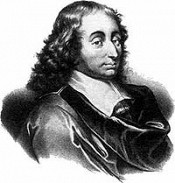
Blaise Pascal (French pronunciation: [blɛz paskal]), (June 19, 1623, in Clermont-Ferrand, France – August 19, 1662, in Paris) was a French mathematician, physicist, and religious philosopher. He was a child prodigy who was educated by his father, a civil servant. Pascal's earliest work was in the natural and applied sciences where he made important contributions to the construction of mechanical calculators, the study of fluids, and clarified the concepts of pressure and vacuum by generalizing the work of Evangelista Torricelli. Pascal also wrote in defense of the scientific method. Pascal was a mathematician of the first order. He helped create two major new areas of research. He wrote a significant treatise on the subject of projective geometry at the age of sixteen, and later corresponded with Pierre de Fermat on probability theory, strongly influencing the development of modern economics and social science. Following Galileo and Torricelli, in 1646 he refuted Aristotle's followers who insisted that nature abhors a vacuum. His results caused many disputes before being accepted. In 1646, he and his sister Jacqueline identified with the religious movement within Catholicism known by its detractors as Jansenism.[1] His father died in 1651. Following a mystical experience in late 1654, he had his "second conversion", abandoned his scientific work, and devoted himself to philosophy and theology. His two most famous works date from this period: the Lettres provinciales and the Pensées, the former set in the conflict between Jansenists and Jesuits. In this year, he also wrote an important treatise on the arithmetic of triangles. Between 1658 and 1659 he wrote on the cycloid and its use in calculating the volume of solids. Pascal had poor health throughout his life and his death came just two months after his 39th birthday.[2] Pascal lost his mother, Antoinette Begon, at the age of three. His father, Étienne Pascal (1588–1651), who also had an interest in science and mathematics, was a local judge and member of the "Noblesse de Robe". Pascal had two sisters, the younger Jacqueline and the elder Gilberte. In 1631, after the death of his wife, Étienne Pascal moved with his children to Paris. The newly arrived family soon hired Louise Delfault, a maid who eventually became an instrumental member of the family. Étienne, who never remarried, decided that he alone would educate his children, for they all showed extraordinary intellectual ability, particularly his son Blaise. The young Pascal showed an amazing aptitude for mathematics and science. At the age of eleven, he composed a short treatise on the sounds of vibrating bodies, and Étienne responded by forbidding his son to further pursue mathematics until the age of fifteen so as not to harm his study of Latin and Greek. One day, however, Étienne found Blaise (now twelve) writing an independent proof that the sum of the angles of a triangle is equal to two right angles with a piece of coal on a wall. From then on, the boy was allowed to study Euclid; perhaps more importantly, he was allowed to sit in as a silent on-looker at the gatherings of some of the greatest mathematicians and scientists in Europe—such as Roberval, Desargues, Mydorge, Gassendi, and Descartes—in the monastic cell of Père Mersenne. Particularly of interest to Pascal was a work of Desargues on conic sections. Following Desargues' thinking, the sixteen-year-old Pascal produced, as a means of proof, a short treatise on what was called the "Mystic Hexagram", Essai pour les coniques ("Essay on Conics") and sent it—his first serious work of mathematics—to Père Mersenne in Paris; it is known still today as Pascal's theorem. It states that if a hexagon is inscribed in a circle (or conic) then the three intersection points of opposite sides lie on a line (called the Pascal line). Pascal's work was so precocious that Descartes, when shown the manuscript, refused to believe that the composition was not by the elder Pascal. When assured by Mersenne that it was, indeed, the product of the son not the father, Descartes dismissed it with a sniff: "I do not find it strange that he has offered demonstrations about conics more appropriate than those of the ancients," adding, "but other matters related to this subject can be proposed that would scarcely occur to a sixteen-year-old child."[3] In France at that time offices and positions could be—and were—bought and sold. In 1631 Étienne sold his position as second president of the Cour des Aides for 65,665 livres.[4] The money was invested in a government bond which provided if not a lavish then certainly a comfortable income which allowed the Pascal family to move to, and enjoy, Paris. But in 1638 Richelieu, desperate for money to carry on the Thirty Year War, defaulted on the government's bonds. Suddenly Étienne Pascal's worth had dropped from nearly 66,000 livres to less than 7,300. Like so many others, Étienne was eventually forced to flee Paris because of his opposition to the fiscal policies of Cardinal Richelieu, leaving his three children in the care of his neighbor Madame Sainctot, a great beauty with an infamous past who kept one of the most glittering and intellectual salons in all France. It was only when Jacqueline performed well in a children's play with Richelieu in attendance that Étienne was pardoned. In time Étienne was back in good graces with the cardinal, and in 1639 had been appointed the king's commissioner of taxes in the city of Rouen — a city whose tax records, thanks to uprisings, were in utter chaos. In 1642, in an effort to ease his father's endless, exhausting calculations, and recalculations, of taxes owed and paid, Pascal, not yet nineteen, constructed a mechanical calculator capable of addition and subtraction, called Pascal's calculator or the Pascaline. The Musée des Arts et Métiers in Paris and the Zwinger museum in Dresden, Germany, exhibit two of his original mechanical calculators. Though these machines are early forerunners to computer engineering, the calculator failed to be a great commercial success. Because it was extraordinarily expensive the Pascaline became little more than a toy, and status symbol, for the very rich both in France and throughout Europe. However, Pascal continued to make improvements to his design through the next decade and built fifty machines in total. Pascal continued to influence mathematics throughout his life. His Traité du triangle arithmétique ("Treatise on the Arithmetical Triangle") of 1653 described a convenient tabular presentation for binomial coefficients, now called Pascal's triangle. The triangle can also be represented: He defines the numbers in the triangle by recursion: Call the number in the (m+1)st row and (n+1)st column tmn. Then tmn = tm-1,n + tm,n-1, for m = 0, 1, 2... and n = 0, 1, 2... The boundary conditions are tm, -1 = 0, t-1, n for m = 1, 2, 3... and n = 1, 2, 3... The generator t00 = 1. Pascal concludes with the proof, In 1654, prompted by a friend interested in gambling problems, he corresponded with Fermat on the subject, and from that collaboration was born the mathematical theory of probabilities. The friend was the Chevalier de Méré, and the specific problem was that of two players who want to finish a game early and, given the current circumstances of the game, want to divide the stakes fairly, based on the chance each has of winning the game from that point. From this discussion, the notion of expected value was introduced. Pascal later (in the Pensées) used a probabilistic argument, Pascal's Wager, to justify belief in God and a virtuous life. The work done by Fermat and Pascal into the calculus of probabilities laid important groundwork for Leibniz' formulation of the infinitesimal calculus.[5] After a religious experience in 1654, Pascal mostly gave up work in mathematics. However, after a sleepless night in 1658, he anonymously offered a prize for the quadrature of a cycloid. Solutions were offered by John Wallis, Christiaan Huygens, Christopher Wren, and others; Pascal, under the pseudonym Amos Dettonville, published his own solution. Controversy and heated argument followed after Pascal announced himself the winner. Pascal's major contribution to the philosophy of mathematics came with his De l'Esprit géométrique ("On the Geometrical Spirit"), originally written as a preface to a geometry textbook for one of the famous "Petites-Ecoles de Port-Royal" ("Little Schools of Port-Royal"). The work was unpublished until over a century after his death. Here, Pascal looked into the issue of discovering truths, arguing that the ideal of such a method would be to found all propositions on already established truths. At the same time, however, he claimed this was impossible because such established truths would require other truths to back them up—first principles, therefore, cannot be reached. Based on this, Pascal argued that the procedure used in geometry was as perfect as possible, with certain principles assumed and other propositions developed from them. Nevertheless, there was no way to know the assumed principles to be true. Pascal also used De l'Esprit géométrique to develop a theory of definition. He distinguished between definitions which are conventional labels defined by the writer and definitions which are within the language and understood by everyone because they naturally designate their referent. The second type would be characteristic of the philosophy of essentialism. Pascal claimed that only definitions of the first type were important to science and mathematics, arguing that those fields should adopt the philosophy of formalism as formulated by Descartes. In De l'Art de persuader ("On the Art of Persuasion"), Pascal looked deeper into geometry's axiomatic method, specifically the question of how people come to be convinced of the axioms upon which later conclusions are based. Pascal agreed with Montaigne that achieving certainty in these axioms and conclusions through human methods is impossible. He asserted that these principles can only be grasped through intuition, and that this fact underscored the necessity for submission to God in searching out truths.
do you like this author?
What readers are saying
What do you think? Write your own comment on this book!
write a commentWhat readers are saying
What do you think? Write your own comment on this author!
write a commentBook list

thoughts on religion and other important subjects recently translated from the
Series:
Unknown
Year:
Unknown
Raiting:
4.5/5
Show more
add to favoritesadd In favorites
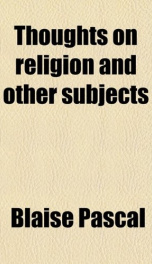
thoughts on religion and other subjects
Series:
Unknown
Year:
Unknown
Raiting:
4/5
Purchase of this book includes free trial access to www.million-books.com where you can read more than a million books for free. This is an OCR edition with typos. Excerpt from book: THOUGHTS O1V RELIGION. CHAPTER I. ON SELF-KNOWLEDGE. When man considers himself, the first thing that claims his notice is his body ; that is, a certain portion of matter evidently appertaining to himself. But if he would know what this is, he must compare himself with all that is superior or inferior to him ; and thus he will ascertain his own just limits. But he must not rest contented with the examination of the things around him. Let him contemplate universal nature in all the height and fulness of its majesty. Let him consider that glorious luminary, hung as an eternal lamp, to enlighten the universe. Let him consider that this earth is a mere point, compared with the vast circuit which that bright orb describes. Let him learn with wonder, that this wide orbit itself is but a speck compared with the course of the stars, which roll in the firmament of heaven. And if here our sight is limited, let the imagination take up the inquiry and venture further. It will weary with conceiving, far sooner than nature in supplying food for thought. All that we see of the universe is but an almost imperceptible spot on the ample bosom of nature. No conception even approaches the The Copernican system was not then generally received by the members of the Romish Church. limits of its space. Let us labor as we will with our conceptions, we bring forth mere atoms, compared with the immensity of that which really is. It is an infinite sphere, whose centre is every where, and whose circumference is no where. And, in fact, one of ths most powerful sensible impressions of the omnipotence of God is, that our imagination is lost in this thought. Then let man return to himself, and consider what he is, compared with all else that is. Let him consider himself as a wanderer in ...
Show more
add to favoritesadd In favorites
Book list

thoughts on religion and other important subjects recently translated from the
Series:
Unknown
Year:
Unknown
Raiting:
4.5/5
Show more
add to favoritesadd In favorites

thoughts on religion and other subjects
Series:
Unknown
Year:
Unknown
Raiting:
4/5
Purchase of this book includes free trial access to www.million-books.com where you can read more than a million books for free. This is an OCR edition with typos. Excerpt from book: THOUGHTS O1V RELIGION. CHAPTER I. ON SELF-KNOWLEDGE. When man considers himself, the first thing that claims his notice is his body ; that is, a certain portion of matter evidently appertaining to himself. But if he would know what this is, he must compare himself with all that is superior or inferior to him ; and thus he will ascertain his own just limits. But he must not rest contented with the examination of the things around him. Let him contemplate universal nature in all the height and fulness of its majesty. Let him consider that glorious luminary, hung as an eternal lamp, to enlighten the universe. Let him consider that this earth is a mere point, compared with the vast circuit which that bright orb describes. Let him learn with wonder, that this wide orbit itself is but a speck compared with the course of the stars, which roll in the firmament of heaven. And if here our sight is limited, let the imagination take up the inquiry and venture further. It will weary with conceiving, far sooner than nature in supplying food for thought. All that we see of the universe is but an almost imperceptible spot on the ample bosom of nature. No conception even approaches the The Copernican system was not then generally received by the members of the Romish Church. limits of its space. Let us labor as we will with our conceptions, we bring forth mere atoms, compared with the immensity of that which really is. It is an infinite sphere, whose centre is every where, and whose circumference is no where. And, in fact, one of ths most powerful sensible impressions of the omnipotence of God is, that our imagination is lost in this thought. Then let man return to himself, and consider what he is, compared with all else that is. Let him consider himself as a wanderer in ...
Show more
add to favoritesadd In favorites
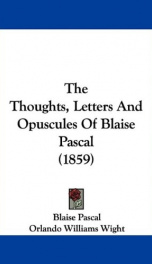
the thoughts letters and opuscules of blaise pascal
Series:
Unknown
Year:
Unknown
Raiting:
3.5/5
With Introductory Notices, And Notes From All The Commentators.
Show more
add to favoritesadd In favorites

the provincial letters of blaise pascal a new translation with historical intro
Series:
Unknown
Year:
Unknown
Raiting:
2.5/5
Show more
add to favoritesadd In favorites
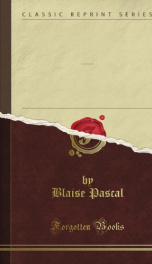
selections from pascal
Series:
Unknown
Year:
Unknown
Raiting:
4/5
Ibeatb's flßofcern Xanguaöe SeriesSELECTIONS FROMPASCALEDITED WITH AN INTRODUCTION AND NOTESF. M. WARRENProfessor in Yale UniversityBOSTON, U. S. A. D. C. HEATH & CO., PUBLISHERS 1906About the Publisher Forgotten Books is a publisher of historical writings, such as: Philosophy, Classics, Science, Religion, History, Folklore and Mythology.Forgotten Books' Classic Reprint Series utilizes the latest technology to regenerate facsimiles of historically important writings. Careful attention has been made to accurately preserve the original format of each page whilst digitally enhancing the difficult to read text. Read books online for free at www.forgottenbooks.org
Show more
add to favoritesadd In favorites
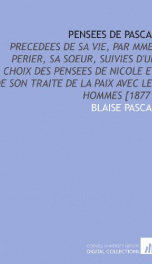
pensees de pascal precedees de sa vie
Series:
Unknown
Year:
Unknown
Raiting:
2.5/5
Originally published in 1877. This volume from the Cornell University Library's print collections was scanned on an APT BookScan and converted to JPG 2000 format by Kirtas Technologies. All titles scanned cover to cover and pages may include marks notations and other marginalia present in the original volume.
Show more
add to favoritesadd In favorites

monsieur pascalls thoughts meditations and prayers touching matters moral an
Series:
Unknown
Year:
Unknown
Raiting:
4.5/5
Show more
add to favoritesadd In favorites
What readers are saying
What do you think? Write your own comment on this author!
write a commentif you like Pascal Blaise try:
readers also enjoyed
What readers are saying
What do you think? Write your own comment on this author!
write a commentGenre
if you like Pascal Blaise try:
readers also enjoyed
Do you want to read a book that interests you? It’s EASY!
Create an account and send a request for reading to other users on the Webpage of the book!

